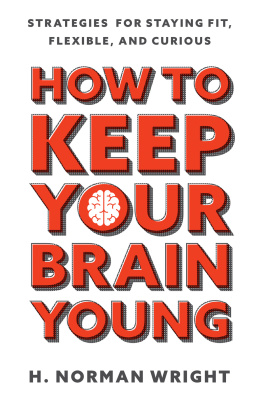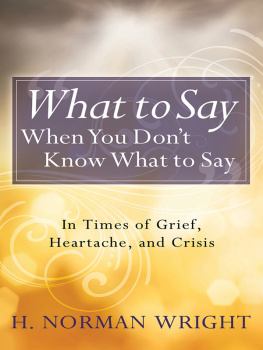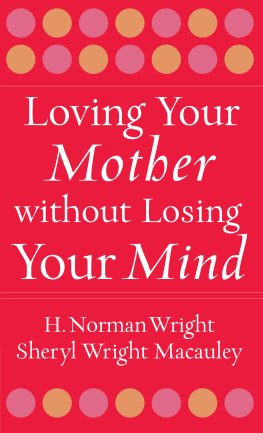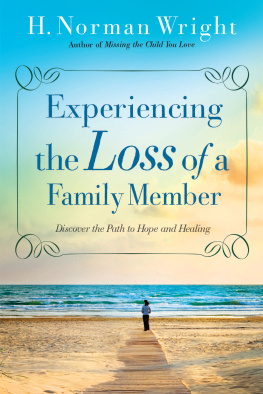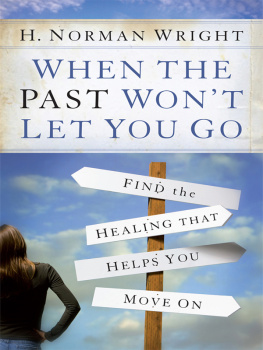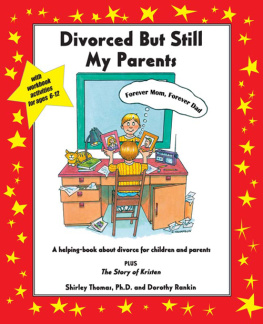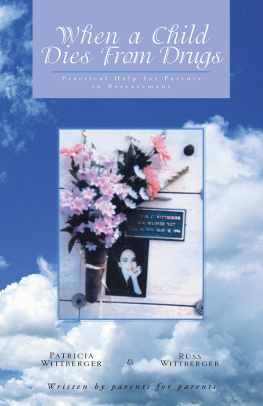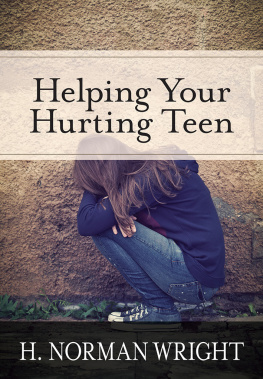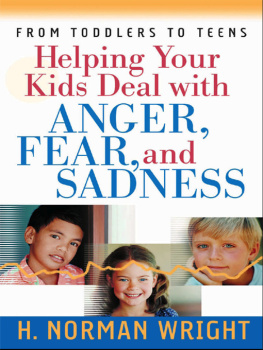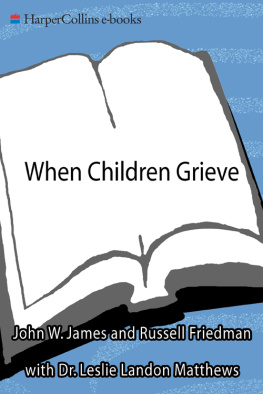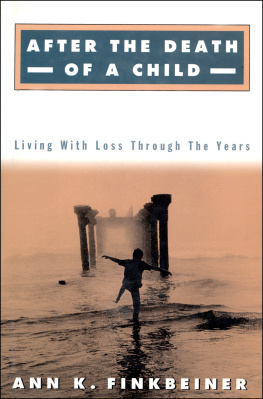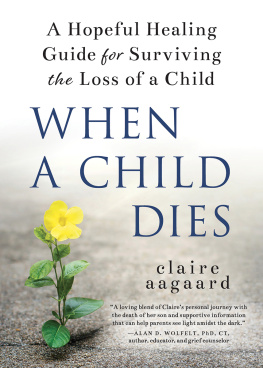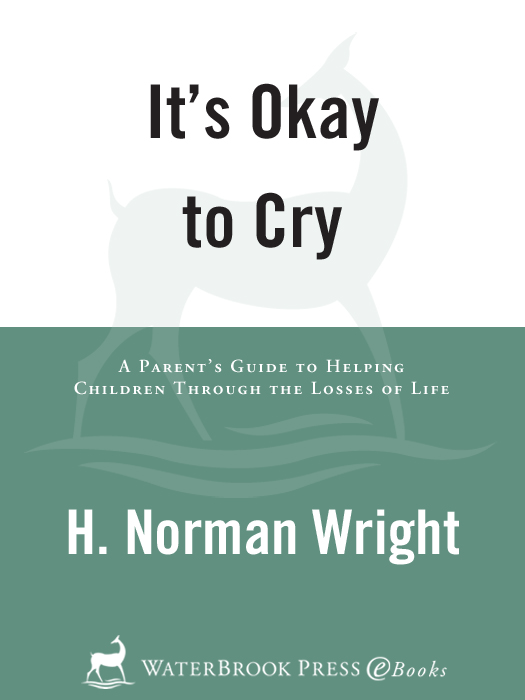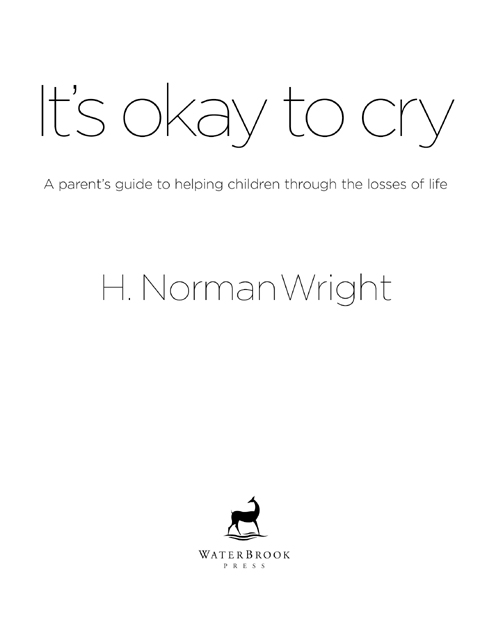Praise for
Its Okay to Cry
Open the mind of a child and you might expect to find flowers, sunshine, and Sponge Bob. Norm Wright helps us to understand that a childs world is also filled with real hurts and disappointments due to a variety of losses suffered and stored. And, after all, as Charles Dodgson (a.k.a. Lewis Carroll) so eloquently reminds us of adults, We are but older children, dear, who fret to find our bedtime near. The losses of a childs world become the losses of our own psyches. Its Okay to Cry was more than a learning experience. It was necessary therapy.
M IKE K LUMPP , author of The Single Dads Survival Guide and father of eight
This is a wonderfully helpful, practical book! It needs to be read by every parent, grandparent, and worker with children so we can help a generation that sees too much, is exposed to too much, and consequently knows or experiences too muchtoo much of everything and often not enough of their parents. This is a book that will help you be there for your child in an understanding and constructive way.
K AY A RTHUR , CEO and cofounder of Precept Ministries International
Every parent who has ever said a few words over a goldfish in a toilet bowl or felt the numbness of an unexpected diagnosis in a pediatricians office will appreciate the heartfelt wisdom in Its Okay to Cry. Norm Wright tenderly and skillfully equips parents to help children cultivate a healthy response to lifes many pains and sorrows.
L ORI B ORGMAN , columnist and author of Pass the Faith, Please
This is an incredible gift book for all whose lives intersect grieving children. Read it with a highlighter because, sooner or later, you will need the wise counsel that Norm Wright offers. I especially found helpful his suggestions for An Anxiety Fable to help children begin to find words for their losses. I will be a better grief counselor for having read this important, practical resource.
H AROLD I VAN S MITH , CT, thanatologist and author of When a Child You Love Is Grieving
I TS O KAY TO C RY
P UBLISHED BY W ATERBROOK P RESS
2375 Telstar Drive, Suite 160 Colorado Springs, Colorado 80920
A division of Random House, Inc.
All Scripture quotations, unless otherwise indicated, are taken from the Holy Bible, New International Version. NIV. Copyright 1973, 1978, 1984 by the International Bible Society. Used by permission of Zondervan Publishing House. All rights reserved. Scripture quotations marked (AMP) are taken from the Amplified Bible, Copyright 1954, 1958, 1962, 1964, 1987 by The Lockman Foundation. All rights reserved. Used by permission. (www.Lockman.org). Scripture quotations marked (NASB) are taken from the New American Standard Bible. Copyright The Lockman Foundation 1960, 1962, 1963, 1968, 1971, 1972, 1973, 1975, 1977, 1995. Used by permission. (www.Lockman.org). Scripture quotations marked (TEV) are from the Todays English VersionSecond Edition. Copyright 1992 by American Bible Society. Used by permission.
Details in some anecdotes and stories have been changed to protect the identities of the persons involved.
Copyright 2004 by H. Norman Wright
All rights reserved. No part of this book may be reproduced or transmitted in any form or by any means, electronic or mechanical, including photocopying and recording, or by any information storage and retrieval system, without permission in writing from the publisher.
W ATER B ROOK and its deer design logo are registered trademarks of WaterBrook Press, a division of Random House, Inc.
Library of Congress Cataloging-in-Publication Data
Wright, H. Norman.
Its okay to cry : a parents guide to helping children through the losses of life / H. Norman Wright. 1st ed.
p. cm.
eISBN: 978-0-307-55206-8
1. ChildrenReligious life. 2. ParentsReligious life. 3. Loss (Psychology) in childrenReligious aspectsChristianity. I. Title.
BV4571.3.W75 2004
248.86dc22
2003026030
v3.1
Contents
When Loss Comes Calling
I got an empty spot in my tummy. Food doesnt fill it up.
Susan, age 4
Theres a big hurt in my insides.
Geniene, age 3
I dont feel nothing. And I dont want to.
Jimmy, age 8
I dont like to play anymore. I have bad thoughts.
Tom, age 6
My food doesnt taste good. I dont like to eat.
Sonya, age 6
Im sad all the time. Its like I dont live in my house anymore, but I do.
Phil, age 7
All of these children have experienced a loss. The particular missing entity may not seem like much of a loss to an adult. But in the life of each child, it was a momentous event. For a child, grief is always about losing something 100 percent; present or future, its completely taken away.
Will you be able to help a childyour childthrough that kind of loss? I know you want to. And I believe youll have the skills to do it after reading this book. But it wont be easy, primarily because its not an easy thing to move into our painful feelings rather than flee them. In fact, just talking about the topic raises our anxiety levels significantly. I recall several parents discussing their difficulties in talking about death, not just with children, but with anyone. Listen to their comments:
It makes me anxious. Id rather avoid it. And I dont want to make others anxious or sad either.
When I talk about it, I start to cry. I dont like that. Crying can make others cry, and then I feel responsible as well.
You know, as I think about it, why should any of us know what to say about death? No one I know talks about it.
I dont want my children to get all morbid. I want them to think about life, not death.
One of our difficulties resides in the fact that children today are sheltered from the normal transitions of life. Death is a stranger, an intruder, not a normal part of living as it was a century or two ago. It used to be that several generations lived in the same house or at least close by. The youngest children learned about birth, illness, old age, and death because these things all happened in their home.
Other generations included children who saw their siblings, cousins, and friends die from diseases such as diphtheria, smallpox, polio, and even the flu. They were around their grandparents so much that they watched them age day by dayand perhaps helped in their care until they died.
And everyone in the family mourned. Together.
Often the local pastor conducted the viewing and funeral in the home. If the body was there for a viewing, it probably stayed overnight. Can you imagine your child (or even yourself, for that matter) sleeping in the same house with a dead body? What used to be so normal would probably be considered dysfunctional today.
Many children have never seen chicks born, or puppies or kittens, not to mention a horse or calf. They dont know that some animals are stillborn and never make it. They eat their chicken, turkey, and beef, giving no thought to the fact that something had to die.
For other generations, though, death was as much a part of their existence as life. Death happened all around them, so a child grew into the knowledge of death in his own way and his own time. There was less mystery about it.


